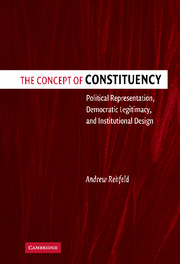 The Concept of Constituency
The Concept of Constituency Book contents
- Frontmatter
- Contents
- List of Tables
- Preface
- PART I CONCEPTUAL FOUNDATIONS: ON CONSTITUENCY AND POLITICAL REPRESENTATION
- PART II HISTORICAL JUSTIFICATIONS: ON THE ORIGINS OF TERRITORIAL CONSTITUENCIES IN THE UNITED STATES
- PART III NORMATIVE APPLICATIONS: ON LEGITIMATE REPRESENTATION AND INSTITUTIONAL DESIGN
- 7 Territory Reconsidered
- 8 Legitimate Representation and Institutional Design: For Permanent, Involuntary, Heterogeneous Constituencies
- 9 Random Constituencies
- 10 Epilogue: The Random Constituency Fifty Years from Now
- Index
9 - Random Constituencies
Published online by Cambridge University Press: 27 July 2009
- Frontmatter
- Contents
- List of Tables
- Preface
- PART I CONCEPTUAL FOUNDATIONS: ON CONSTITUENCY AND POLITICAL REPRESENTATION
- PART II HISTORICAL JUSTIFICATIONS: ON THE ORIGINS OF TERRITORIAL CONSTITUENCIES IN THE UNITED STATES
- PART III NORMATIVE APPLICATIONS: ON LEGITIMATE REPRESENTATION AND INSTITUTIONAL DESIGN
- 7 Territory Reconsidered
- 8 Legitimate Representation and Institutional Design: For Permanent, Involuntary, Heterogeneous Constituencies
- 9 Random Constituencies
- 10 Epilogue: The Random Constituency Fifty Years from Now
- Index
Summary
INTRODUCTION AND CHAPTER OVERVIEW
A legislature, John Adams argued in 1776, “should be an exact portrait, in miniature, of the people at large, as it should think, feel, reason and act like them.” Over two centuries later, this call for “mirror representation” works most effectively as a critique: How can a legislature of mostly white men, for example, possibly represent the wide interests and perspectives of a diverse population? Of course, it is more problematic to specify which other features of the whole ought to be added. As Pitkin noted, few would want a legislature that looked like a nation in terms of reflecting, for example, its average “intelligence, public spiritedness, and experience.” Still, the concern for mirror representation has led to legislatures that are more deliberatively heterogeneous in ways that seem reasonable, even necessary to the proper function of representative bodies. In the United States, for example, territorial districts are drawn or gerrymandered to ensure the election of minorities and political parties into the legislature. In France, throughout Latin America, and most recently in Afghanistan, democracies are experimenting with gender quota laws that would increase the number of women in the candidate pool and legislature. And the move to proportional representation has been justified by its ability to elect a legislature that is a clearer reflection of the nation's underlying ideological and political views. In short, the “politics of presence,” as Anne Phillips has called it, is gaining traction as an endorsed principle of institutional design.
- Type
- Chapter
- Information
- The Concept of ConstituencyPolitical Representation, Democratic Legitimacy, and Institutional Design, pp. 209 - 239Publisher: Cambridge University PressPrint publication year: 2005


